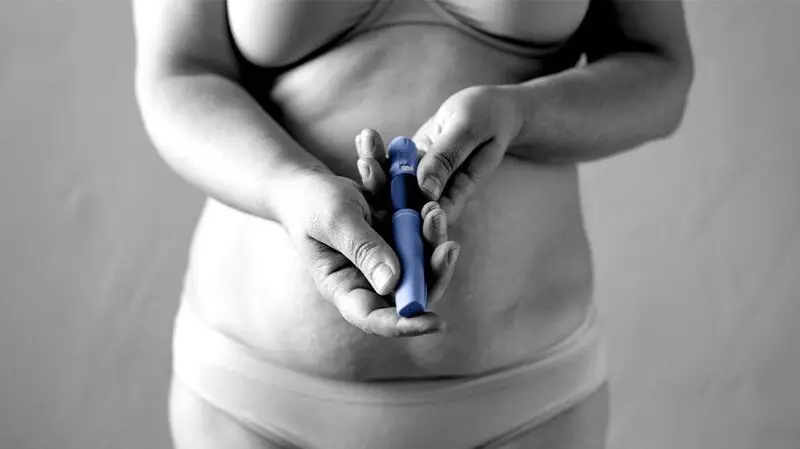
- Researchers report that a genetic test might help determine if semaglutide weight loss medications can help someone lose weight.
- With the genetic test, people would receive a risk score that helps identify who would most likely respond to semaglutide treatments.
- Researchers say that clinical trials showed that people who identified as “hungry gut” positive lost twice as much weight as those who identified as hungry gut negative.
A risk score biomarker that identifies a “hungry gut” phenotype might help determine whether semaglutide medications such as Wegovy are more likely to help a person lose weight, according to a study presented at the Digestive Disease Week 2024 conference.
For their findings, which haven’t been published yet in a peer-reviewed journal, researchers developed a machine-learning gene risk score to predict “hungry gut.” This occurs when someone eats a meal but feels hungry again after an hour or two due to their stomach emptying quickly.
The researchers examined 84 people with obesity or other weight management issues. They collected saliva or blood samples for genetic analysis and obtained information on the participants’ eating habits.
The participants took a semaglutide medication for one year. The scientists recorded total body weight loss at 3, 6, 9, and 12 months. They then determined the probability of a positive semaglutide response based on the type of weight management issue.
The researchers at the Mayo Clinic in Minnesota developed a test called MyPhenome that categorizes the type of obesity phenotype that can help improve weight loss. The four types were:
- Hungry brain – consuming too many calories without feeling full
- Hungry gut – eating a full meal but feeling hungry again soon after
- Emotional hunger – eating in response to an emotional trigger
- Slow Burn – burning calories too slowly
The scientists used an outcomes registry for adults undergoing weight loss treatments. They focused on those who prescribed semaglutide.
The researchers reported that people who were hungry gut positive lost 14% of their body weight at 9 months, compared to 10% for those who were hungry gut negative.
After 12 months, those who were hungry gut positive lost 19% of their total body weight. Those who were hungry gut negative remained right around 10% body weight loss.
Everyone reacts to medication differently.
However, the researchers said the genetic test explains the differences and allows physicians to target the underlying cause of obesity. The researchers said the phenotype test could be used in Healthcare settings to determine who would respond positively to semaglutide.
The presentation indicates that the test predicts with 75% accuracy who will respond to semaglutide without using “trial and error” to determine whether a medication works.
“Severe obesity is deadly,” Dr. Mitchell Roslin, the chief of bariatric surgery at Northwell Lenox Hill Hospital in New York who was not involved in the research, told Medical News Today. “It creates a phase change. Thus, people’s bodies are 10 to 20 years older than their chronological age. Heart disease is the biggest killer.”
Semaglutide is a relatively new obesity medication. Health insurance does not always cover the cost. Paying out of pocket can cost an individual close to $1,000 per month.
Researchers said knowing if the medication will work can help physicians and people better decide whether to try it.
“As with all medications, semaglutide comes with side effects. People might experience GI symptoms, such as nausea, vomiting, diarrhea, or constipation,” said Dr. Mir Ali, a bariatric surgeon and medical director of MemorialCare Surgical Weight Loss Center at Orange Coast Medical Center in California.
“Usually, side effects disappear as the body adjusts to the medication. Even so, starting with the lowest dose and increasing as necessary is important,” Ali, who was not involved in the study, told Medical News Today.
Not all physicians plan on using the risk score in their practice.
“I would probably not use the risk score calculator to determine if one of my patients should use or not use semaglutide,” said Ali. “There are a lot of calculators that may or may not be helpful. Using calculators is cumbersome and I probably would not ask patients to spend extra money on genetic testing.”
Ali said he looks at different factors before prescribing weight loss medication. These factors include:
- How overweight is the person.
- What is their body mass index (BMI).
- What weight loss strategies have been used in the past, and to what extent did they work.
- Do they fit the criteria for weight loss surgery.
“Weight loss surgery is still the most effective for losing and maintaining weight loss,” Ali said. “If they do not fit the criteria for surgery, I will consider the GLP-1 analogue medications, such as semaglutide.”
“It is important to remember, no matter which treatment is used, the goal is to change habits, develop healthy eating patterns, and give lifelong changes,” Ali emphasized.
Roslin agrees.
“We aspire to teach people to use weight loss tools in the best way possible,” he said.





